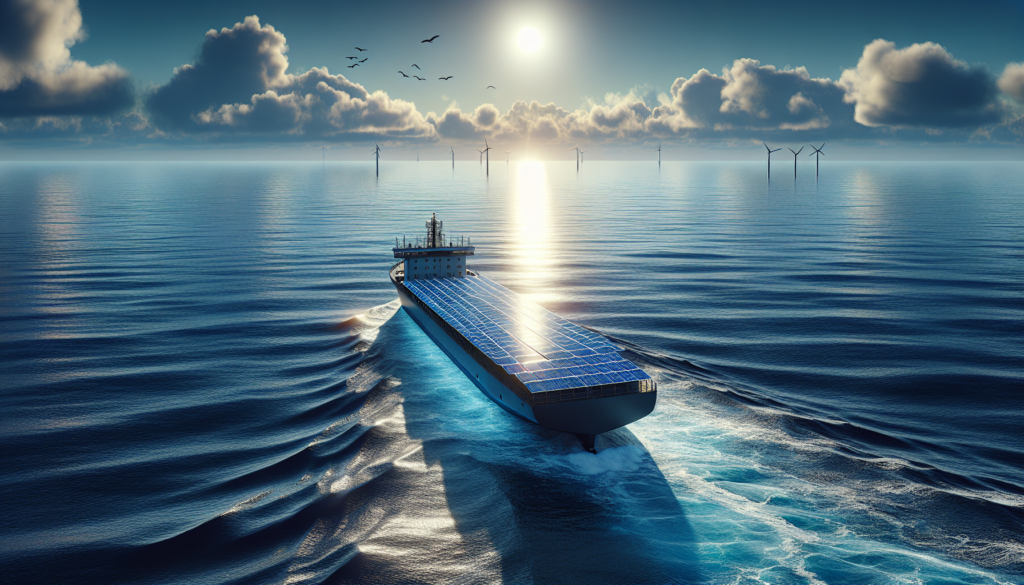Exploring the World of Marine Solar Panels
Imagine a world where renewable energy sources power our oceans, where ships and boats harness the sun’s energy to sail the seas without relying on fossil fuels. This vision is becoming a reality with the advent of marine solar panels, a cutting-edge technology that is revolutionizing the maritime industry. In this article, we will delve into the fascinating world of marine solar panels, exploring their history, applications, benefits, and future prospects. Join us on this journey as we uncover the untapped potential of solar energy on the high seas.
The Evolution of Marine Solar Panels
Marine solar panels have come a long way since their inception. The idea of harnessing solar energy to power boats and ships dates back to the late 19th century when solar cells were first discovered. However, it wasn’t until the late 20th century that the technology began to gain traction in the maritime industry. The first commercial marine solar panels were introduced in the early 2000s, offering a sustainable alternative to traditional fossil fuel-powered engines.
Today, marine solar panels come in a variety of shapes and sizes, ranging from flexible thin-film panels that can be integrated into the sails of a boat to rigid panels that can be mounted on the deck or cabin top. These panels are designed to withstand the harsh marine environment, with features such as waterproof coatings and corrosion-resistant materials.
The Benefits of Marine Solar Panels
The adoption of marine solar panels offers a myriad of benefits for boat owners, shipping companies, and the environment. One of the primary advantages of solar panels is their ability to reduce fuel consumption and operating costs. By harnessing the power of the sun, boats can generate clean energy to supplement or even replace traditional fuel sources, leading to significant savings over time.
Additionally, marine solar panels help reduce the carbon footprint of ships and boats, contributing to the fight against climate change. By using renewable energy sources like solar power, vessels can minimize their impact on the environment and promote sustainability in the maritime industry.
Another benefit of marine solar panels is their low maintenance requirements. Unlike traditional engines that require frequent servicing and repairs, solar panels are relatively maintenance-free, with minimal components that can break or wear out. This translates to fewer downtime and lower maintenance costs for boat owners.
Applications of Marine Solar Panels
Marine solar panels have a wide range of applications in the maritime industry, from small recreational boats to large commercial vessels. One of the most common uses of solar panels on boats is to power auxiliary systems such as lighting, navigation equipment, and refrigeration. By harnessing solar energy, boats can reduce their reliance on diesel generators and batteries, leading to a quieter and more sustainable cruising experience.
Commercial shipping companies are also increasingly turning to solar panels to power onboard systems and reduce fuel consumption. By installing solar panels on the deck or superstructure of a ship, companies can generate electricity to supplement the main engines, leading to cost savings and environmental benefits.
In addition to powering onboard systems, marine solar panels can also be used to charge electric propulsion systems on boats. By combining solar power with electric motors, vessels can achieve greater efficiency and reduce emissions, making them more environmentally friendly and cost-effective.
The Future of Marine Solar Panels
As the maritime industry continues to embrace sustainable practices, the future of marine solar panels looks promising. Advancements in solar panel technology, such as increased efficiency and durability, are making solar power an increasingly viable option for boats and ships of all sizes. Innovations like solar sails and solar-powered ferries are paving the way for a greener and more sustainable future on the high seas.
Furthermore, government incentives and regulations aimed at reducing carbon emissions are driving the adoption of marine solar panels among shipping companies worldwide. Countries like Norway and Denmark have implemented strict emissions standards for ships operating in their waters, incentivizing the use of renewable energy sources like solar power.
In conclusion, marine solar panels are revolutionizing the maritime industry by offering a clean, sustainable, and cost-effective alternative to traditional fuel sources. By harnessing the power of the sun, boats and ships can reduce their carbon footprint, lower operating costs, and promote sustainability on the high seas. The future of marine solar panels is bright, with endless possibilities for innovation and growth in the years to come.
Expert Opinions
Industry experts agree that marine solar panels are a game-changer for the maritime industry, offering a sustainable solution to the challenges of fuel consumption and emissions. According to Dr. Sarah Green, a marine biologist and renewable energy expert, “Marine solar panels have the potential to transform the way we think about powering boats and ships. By harnessing the sun’s energy, vessels can reduce their environmental impact and pave the way for a cleaner, greener future.”
FAQs
1. Are marine solar panels durable enough to withstand the harsh marine environment?
Most marine solar panels are designed to be waterproof and corrosion-resistant, making them durable enough to withstand the rigors of the sea.
2. How much energy can marine solar panels generate?
The amount of energy generated by marine solar panels depends on factors such as panel size, efficiency, and sun exposure. On average, a marine solar panel can generate enough energy to power auxiliary systems on a boat or ship.
To Wrap Things Up
In conclusion, marine solar panels are a cutting-edge technology that is reshaping the maritime industry. By harnessing the power of the sun, boats and ships can reduce their carbon footprint, lower operating costs, and promote sustainability on the high seas. The adoption of marine solar panels is on the rise, with vessels of all sizes turning to solar power as a clean and efficient alternative to traditional fuel sources. As we look to the future, the potential of marine solar panels is limitless, offering endless possibilities for innovation and growth in the maritime industry.



